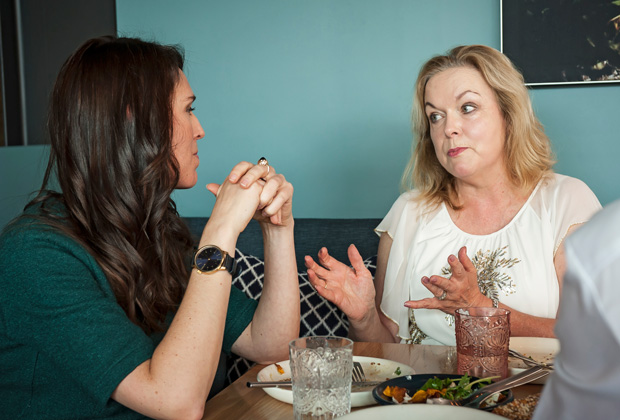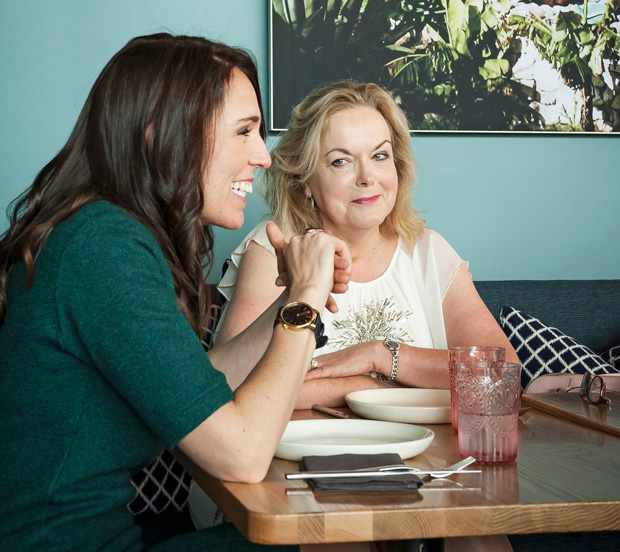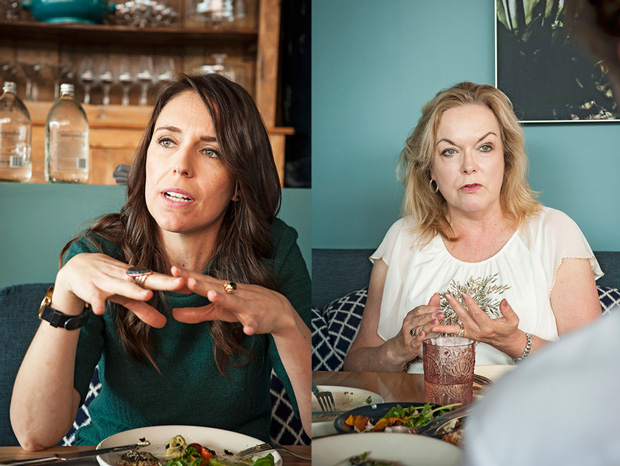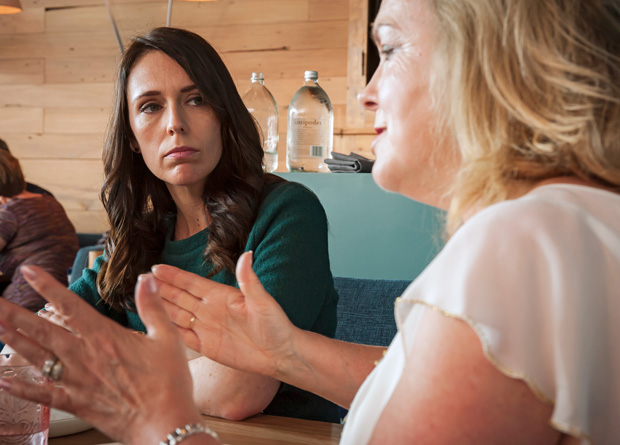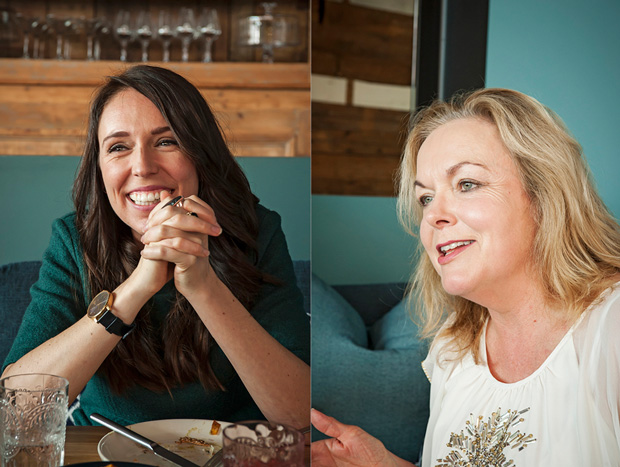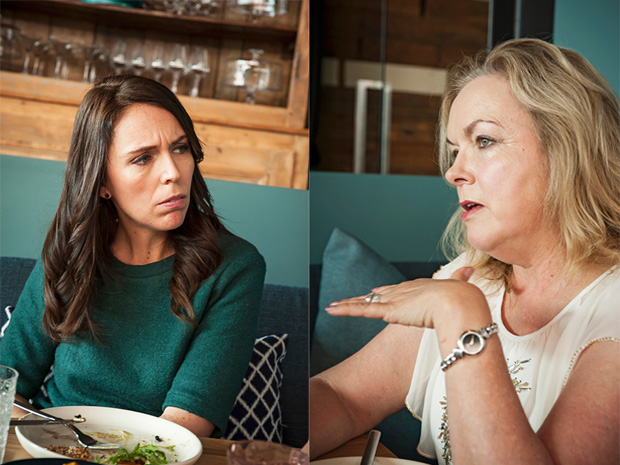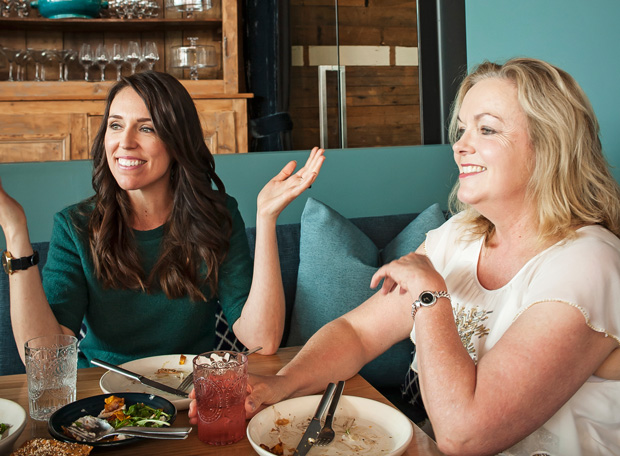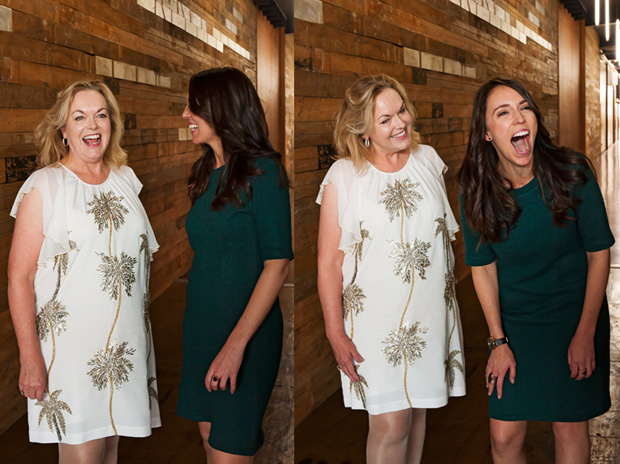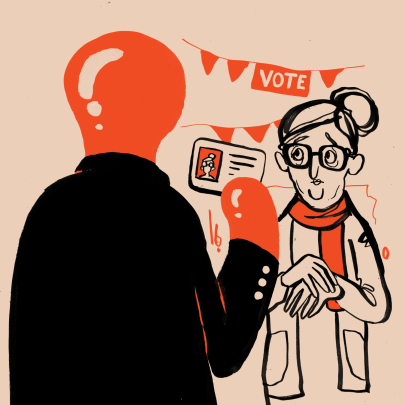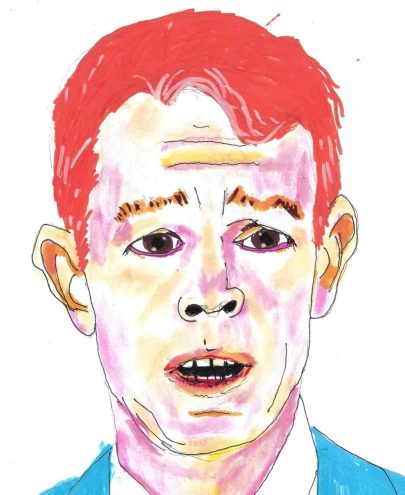Dec 21, 2015 Politics
What’s going on here? Staunch political opponents Jacinda Ardern and Judith Collins having lunch together? These two MPs have hardly ever said two civil words to each other, and now they’re BFFs? Well, not exactly…
This article was first published in the December 2015 issue of Metro. Photos: Simon Young.
I’d invited them to lunch. It was a Monday, no Parliament, and they didn’t have much to do that afternoon, so I said, “Who’d like a glass of wine?”
“Ah, no,” said Judith Collins, National MP for Papakura. “I’m driving. Can you imagine?”
“And I’m paranoid,” said Jacinda Ardern, Labour front-bench list MP.
Worth a try. Collins had been the first to arrive, walking across the carpark in a billowy white sunfrock with cap sleeves and gold appliqué, hair bouncing in the breeze. Off duty clothes. She has a good grin and she was wearing it.
Ardern turned up a little later, dressed far more formally in a tailored green dress and with her hair recently GHD’d. She also has a good grin, and of course she was wearing it too.
It turned out to be the first time they’d really talked to each other. Except that one time, on a plane, when they were seated together; they talked about movies and books.
“Because we’re just human, really,” said Collins.
They grinned at each other. They did that a lot right through the lunch. It wasn’t just that they were on their best behaviour. Like most female politicians, in my experience, neither of them plays flirty “I’m so pleased to see you” games with the media. But they do know how to twinkle and shine. They’re animated and engaged, even when they’re relaxed.
When I listened to the tape afterwards I discovered that towards the end, both started to slur their words. Even without alcohol. It was tiredness: after 90 minutes of relentless talk, of doing their best to be entertaining, they were slowing down.
I began by asking if either of them had thought about standing for mayor.
“Most certainly not,” said Ardern.
“I’m sure everyone would like Jacinda to stand for mayor,” said Collins.
“I’m not sure that’s correct,” said Ardern.
“I think it would be excellent,” said Collins. “I know a lot of people want you to stand, Jacinda, and I would obviously help you.”
Ardern said she thought a lot of people wanted her to stand for Auckland Central.
“Do they?” said Collins, with wide eyes.
Then Ardern got all party-line on it. “I think we do need someone like Phil [Goff], with the experience of managing massive government departments. There’s a bit of waste and duplication that still needs to be weeded out. But at the same time he will be a bridge. That council has some very, very big and different personalities on it, and having someone who’s able to bring the personalities together…”
But surely, I said, the person who best fitted that description was the current deputy mayor, Penny Hulse?
“I think Penny’s fantastic,” Ardern said.
I asked her why, in this diverse and dynamic city, she was supporting the mayoral candidacy of a middle-aged white guy near the end of his career.
“Mmm,” piped up Collins. “Labour Party, come on.”
“He’s not that old,” said Ardern, and turned to Collins. “He’d be similar in age to you, wouldn’t he, Judith?”
“Excuse me!” said Collins. “He’s another generation altogether!” Goff is 62; Collins is 56.
Ardern said Goff had a lot of energy. Collins said, “I actually have a lot of time for him, because I think he was a good minister. I know there are some people on our side who go, ‘Oh, dear God, not Phil Goff,’ but actually I think he would be significantly smarter at it.” Smarter than Len Brown, she meant.
We talked about transport, housing, the container port, but it was all pretty boring. Then we talked about racism. Collins had said in a speech that we should be celebrating the fast growth of New Zealand’s Chinese population.
“And so we should be,” she said now.
Do we, though?
“Well,” she said, “I am Mrs Wong-Tung.” (Her husband, David Wong-Tung, is a Samoan New Zealander whose grandfather was Chinese.) “And no we don’t.”
In Parliament, she added, there are things said she “would not have heard 12, 13 years ago. Particularly focusing on people of Chinese ethnicity.”
She was talking about Winston Peters and about the Labour Party. About how last July, Labour caused an outcry when it released data showing people with Chinese-sounding names were buying a lot of property in Auckland. She looked sideways at Ardern, judging how far she should go with this.
“It’s a bit like scratching an itch, and giving permission,” she said. “When MPs talk in derogatory terms of people’s ethnicity, it actually gives permission for everyone else to say the same.”
Ardern was embarrassed. I asked Collins if she thought it was getting worse.
“Yes, I think it is.”
“I disagree,” said Ardern.
“Well, that’s because you don’t have a Chinese surname,” said Collins. “And you don’t have a son and a husband who get tarred with a teeny bit of their ethnicity.”
For Collins, the story is not new. “When my husband and I got together, 36 years ago, my parents were deeply concerned that I was going out with someone outside my race. It wasn’t that he was a Samoan… it was the fact that he had a Chinese surname and that his grandfather was Chinese. That was more important than anything else. I hear a lot more racist views than most people would expect.”
While she said that, Ardern was going “Mmm, mmm.”
Collins talked a bit more about her family background. “I grew up in the Waikato, as Jacinda did.”
“Which bit?” asked Ardern.
“Walton.”
“I know Walton! I know Walton! Not many people know Walton.”
That would be true. Walton is on a minor road 20km south of Morrinsville, where Ardern grew up.
“Did you have a dairy farm?” she asked.
“My parents were dairy farmers.”
“That’s the only thing in Walton, dairy farms.”
“And racehorses!”
“And racehorses.”
“And the war memorial hall, Jacinda. And the school.”
By this time, Collins had ratcheted up an air of mock offence and Ardern was laughing hard. We returned to the topic.
“It’s about the Chinese,” said Collins. “Indian immigration is as high as Chinese immigration. And yet Indians don’t have the same issue. Why is that?”
Ardern, as you would expect, was staunchly dutiful to the party line. “Is it an ethnicity issue or an ownership issue?”
“What do you mean, ownership? What? Indians buy properties, they buy businesses,” Collins said.
The offence wasn’t mock any more: Collins was genuinely angry, but Ardern doesn’t back off from anger. “I ask that as a genuine question.”
“Indians do exactly the same as Chinese do. They come and buy places, they work hard, their kids do well.”
“But we’re also talking about resident versus non-resident, right?”
“I’m not,” said Collins. “I’m talking about ethnicity.”
“Well I am. Because I do think there is a distinction to be made.”
Collins explained that when people complain about her husband, they never stop to think he might be a New Zealand citizen.
Ardern said she was “not condoning that behaviour at all”.
“Residential status?” said Collins. “Absolute bollocks, actually. Absolute bollocks.”
So racism is getting worse?
Ardern jumped in: “No. I think it’s generational. But to be fair to Judith, I’m not as close, obviously, to some of those personal — ”
“You don’t live with it.”
Ardern made a speech. “What I encounter is a fear based around this notion of ownership. I think we’ve got to figure out a way to have a conversation that is not about ethnicity and the increasingly diverse New Zealand, which we should celebrate. But it is about saying welcome to those who come, who are making a contribution through ownership of housing or business and so on, versus investment that’s coming in from offshore, from those who have no interest in New Zealand and are not resident here. We’ve got to be able to [do that] without it being turned into a conversation about race.”
Actually, that’s only about half the words she used. When Ardern talks, you sense her thinking ahead, constantly getting the next phrases ready to elaborate on what she’s saying. She doesn’t ramble — she stays on point — but her explanations often don’t stop.
Collins, on the other hand, looks for the decisive statement. She relishes the power of a full stop.
Now, she said: “No. Because it’s code, actually.”
She meant Labour let the dogs out. Ardern remained dogged.
“Well we’ve got to stop that. But the next generation, they don’t believe they will own a home. And I mean first-generation New Zealanders as much as New Zealand-born. They do not believe there will be a pension scheme, or that education will be as accessible.”
Her point was, they’re looking for someone to blame.
I asked them, if boatloads of refugees found a way to get to New Zealand, would we be like Germany, welcoming them, or would we be like Hungary, trying to keep them out?
“I hope that we would be Germany,” said Ardern. “But I think we need to reframe this word ‘refugee’. It makes them sound like there isn’t a contribution for them to make.”
They agreed on that, but found a way to argue anyway, about the best way to settle refugees and whether we should be accepting greater numbers.
Collins said, “We couldn’t do it at the moment if everyone wants to come to Auckland. That’s just the way it is. We don’t have enough housing.”
Ardern advocated more settlement in the provinces; Collins didn’t think she appreciated how complicated it was. They went round in circles, then Collins sat up a little straighter and put her hands on the table.
“Look,” she said, “whatever you do, there’s going to be some problem. But I am someone who isn’t frightened of innovation and who isn’t frightened of refugees. Because I look at countries that grow, vibrant societies, and they are all multi-ethnic, and they attract brains and drive and determination. We all came here from somewhere. Why is America so much better than so much of the old world? Because they had that policy. We need to do that.”
This was way off script, at least as far as government policy was concerned. She might as well have been quoting the words on the Statue of Liberty: Give me your tired, your poor, Your huddled masses yearning to breathe free, The wretched refuse of your teeming shore. Did she think her caucus understood that?
“No, not necessarily at all. But then, I don’t think that’s understood by a lot of people. But then, I’m not someone who gets worried about it.”
Did Ardern agree with Collins? There was a pause, which was notable because in this conversation there were very few pauses. “I think,” she said eventually, “there is a fear that exists in the general populace around immigration.”
To be fair to Ardern, she’s a front-bencher and therefore speaks for her party. She has to toe the line. Collins, currently a backbencher, speaks only for herself. She can say whatever she likes.
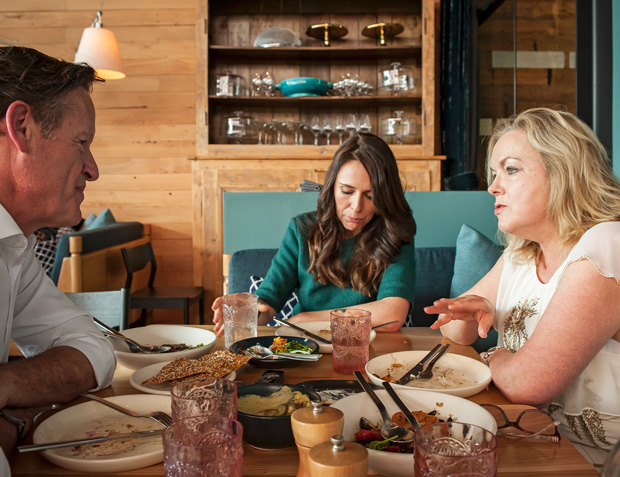
“I say to people,” said Collins, “‘You think refugees are a problem? Go to our prisons. They’re not full of refugees.’”
Ardern spotted an opening. “Then why not increase the quota, Judith?”
“Because we need to make sure that we can support them in that same way.”
“I think we can. We’re expecting Lebanon to support a million people. We don’t think New Zealand can at least have 1500? It’s a pittance.”
“Jacinda, sorry. Jacinda, that is actually really unfair when you consider your Chinese-surnames policy, which was really horrible. And actually made people in my family feel unwanted.”
Suddenly, it was bitter stuff.
“And it was never, ever, ever the intention —”
“Sorry, but that was the way it came across.”
By now, Ardern was using her most exasperated voice. “You’re arguing a very pro-refugee line, and yet none of the policy reflects that. I mean, we’ve still got a 750 quota.”
Collins can do exasperated too, and had started clubbing Ardern with her own name. “Jacinda,” she said. “We have to do it right. You’re telling me we don’t have enough infrastructure, we don’t have housing in Auckland. I’m agreeing with you.”
“Auckland is not our only option!”
“Be fair. If you’re going to put people in places like Palmerston North, we have to make sure they can see opportunities for themselves.”
“Yep.”
“We don’t want people to come in and end up on a benefit for life.”
“It’s very presumptuous to say they would all be on benefits.”
“Actually, Jacinda, that’s the reality. If you take people and you put them in a place where they have no contacts, no background, nobody helping them, what are they going to do?”
“But on the one hand you’re arguing that migrants have huge skillsets, huge drive, and on the other you’re arguing they’ll sit on benefits in the provinces. That’s totally contradictory.”
“No, that’s unfair. Jacinda, that is totally unfair. What I’m saying to you is if we bring refugees in, we have to support them.”
“I don’t disagree.”
“Actually it’s really disingenuous of you to say that.”
“Just reflecting back your words.”
“No, no, you are not, Jacinda. You are using your communications degree for the manipulation of words.”
Ardern was laughing again. “Conflict and consensus is what I trained in.”
“Yes, I can imagine.”
“Judith, you’re refusing to see that I’m actually agreeing with you.”
Which was true. It was the weirdest argument, because I don’t think there was much difference between them. Both said we should welcome more refugees, support them well and find socially and economically viable ways for them to thrive in different parts of the country. And then watch them — and the country with them — flourish.
Holding my breath to hear the new accord announced in Parliament? Nope.
Ardern said: “The provinces would benefit from population growth.”
Collins said: “Actually, Northland. Northland could do with a tremendous amount [of extra people] but they’ve got an MP who doesn’t seem to like anyone with a funny surname.”
For a moment, Ardern thought she meant Kelvin Davis, but of course it was Winston Peters. Whenever a policy threatens to unite the left and right, Parliament’s resident charmer will surely be the rock on which it founders.
The food was good but they were hardly eating. We really needed a change of topic: something light and agreeable. I asked them what they thought of each other.
“I think Jacinda is a very good communicator,” said Collins. “She’s got a lot of drive and enthusiasm, and I think she’s got a great future ahead of her. But I think she would be disappointed that she has not yet won the Auckland Central seat.”
“I am disappointed.”
“And she will have to endure a tremendous amount of jealousy.”
Why? Because, said Collins, of her high profile.
“It puts a big fat target on her head. But you know what, Jacinda? I wouldn’t worry about it. Just go with it.”
Was Collins warning her she would soon be shot down by her own party? Did Ardern agree there was a target on her head?
“No, I don’t feel that way.”
So what did she think of Collins?
“I think she’s extraordinarily resilient. She’s endured things in politics, and actually from her own party, that most people wouldn’t come out the other side of still smiling. And Judith has. So there’s something to be said for resilience in politics.”
“In life, really,” said Collins, and then seemed to search for a covert insult in the praise. “She likes my resilience. Thank you. That’s nice.”
“No,” insisted Ardern, “resilience is really important in that place.”
I reminded Ardern she once told Michele Hewitson at the Herald that she’d only ever met one person she didn’t think was “nice”, and it was Judith Collins. And that she thought Collins would take it as a compliment.
Collins dropped her shoulders and her voice and looked up at Ardern. “Even I, Jacinda, am human.”
“Yeah, no, absolutely.”
“Not,” Collins added quickly, “that I’d want anyone to know that. Please don’t tell anyone.”
“You see, that’s what I meant about it being a compliment. It’s part of your persona.”
“You’ve got to be resilient. It’s a tough environment.”
“Did you build that persona to survive?”
I reminded Collins that she had spoken out about how hard it was to be personally attacked by her political opponents, and to have her family attacked.
“Yeah, I have. I think when we’re in the heat of battle, and it’s all so exciting — it’s after the kill, basically, when the blood is in the air — it is really easy to forget that the other side is actually human.”
Really? Did she think of political debate as a kill, with blood in the air?
“That’s the way that some people…” she said, then changed tack. “I certainly recall there have been times when I’ve thought, just go for it, go for it, go for it. But in the last 12 months or so I’ve been able to sit back and go, ‘You know, that’s actually not that smart.’”
“That’s not how I do politics,” said Ardern. “I would dispute that it has to be that way.”
But wasn’t it exactly that way in her own party?
“What I mean is the commentary around politics. The scorecard. It says you’re a successful politician if you claim scalps, if you’re an attack dog. Putting aside holding the government to account, which is important, they’re forms of politics that I have an aversion to. So I frequently get criticised for that. You know? I’m seen as too nice, too soft, too sensitive, almost.”
This was a bit much for Collins, who was trying to interrupt. But Ardern pushed on.
“The very opposite of Judith! But you know what, I don’t care. I have to sleep at night, and that’s the way I do politics.”
Collins said: “I’ve heard you being criticised very firmly by people in your own party for not being able to put enough pressure on the ministers you are the shadow of.”
Ardern was taken aback. “But that depends if your method is to play the man, not the ball.”
Collins wants to make the politics game work better for women. Ardern wants a different game. The difference may not be as great as it seems.
“The one thing you should never do in politics, I was always told,” said Collins, “you should never go after people’s families. Well, that’s not so apparent with my family.”
It was a peculiar complaint. Opposition MPs “went after” Collins’ husband in 2014 because she had appeared to promote the milk-products exporter Oravida, of which he was a director. It was a legitimate line of inquiry and John Key himself gave Collins a very public telling-off.
Ardern didn’t pick her up on it. Instead, in reference to attacking MPs’ families, she said, “Have you never done that, Judith?”
Collins was angry again. “Never have. Never once brought in other people’s families. Have I brought in yours?”
“No.”
“Have I brought in anyone’s? No.”
“I wasn’t saying —”
“You never do it. I never have. Because that was the rule that I was taught. And yet they still do it. So yeah, it’s a pretty nasty environment. Am I resilient? Yes I am.”
Ardern wasn’t letting it go either. “I still think I do politics differently. I mean, I think I’m resilient as well, but I do politics differently.”
A year ago, Ardern’s boss, Andrew Little, shouted at the Prime Minister to “cut the crap”. Would she do that?
“Oh yeah, I don’t have a problem with that.”
“Of course,” said Collins, “I’d never say that to the PM. I might say it to the Leader of the Opposition.”
They both had a good laugh.
“Look,” said Collins, getting serious again, “I’ve worked in sexist environments before. I know one. I’m in it. Of course it is.”
Then she got back to the way Ardern is perceived. “She’s very well known; she’s a household name. Most MPs aren’t known outside their electorates or own areas. Why? Well, because she knows how to talk to media, she knows how to dress, she gets on with people.”
“I also work hard.”
Did Collins think Ardern was well known because of her looks?
Ardern said, “I wouldn’t expect Judith to raise that.”
Collins said, “Yeah, she’s an attractive woman. But there are lots of attractive women in Parliament, and lots of attractive men as well.”
Ardern started to apologise for telling the Herald that Collins wasn’t nice. Collins jumped in: “I never said anything mean about you, ever, and you went and did that!”
Ardern asked her, “Do you think if I sat across from you in the House, I’d be able to challenge you?”
“Well,” said Collins, “you could challenge me but I don’t think you’d be successful.”
“Do you think anyone would be?”
“Probably not.”
“Good to have that narrowed down.”
I asked if it was actually harder to be a woman in politics now.
“Yes and no,” said Collins. “People like Jenny Shipley and Helen Clark, like Ruth Richardson, did groundbreaking work, whether you liked it or not. So yes, they have helped. But is it easier? I think we’re heard more now. But it’s still hard, you know. It’s never going to be easy and it’s never going to be fair.”
Ardern said, “I think we’re on the cusp of a trend. There is an attempt to humanise politics more, for individuals to bring their own personal quality. I think we’re in a transition period.”
She said that was particularly hard on women, because they were the minority ushering in the change.
They grew up 20km away from each other and 20 years apart in age (Ardern, once the youngest MP, is now 35). Collins’ family was socially conservative and staunchly Labour; Ardern’s was Mormon. They both jumped the fence, politically.
Did Collins have a Damascene conversion?
“Yeah, I did, actually. We went to Hong Kong to get married, so we could avoid the issues of family, who would turn up or not. It was my first time overseas, and I just thought, ‘Wow, look at all these people, working with so much energy.’ It really came from that… And I realised that my principles were very much National Party principles.”
She’s decisive, and prepared to be a rebel.
Ardern didn’t convert: she’s been a liberal since her days as a protesting teenager. But she didn’t leave the church then, as you might expect. She waited till she was “about 23”. Does that make her more a belonger, less a rebel?
“No. When I left the church, it was right at the time of civil unions. I’d been campaigning on that and I had this massive cognitive dissonance with what I’d been raised with. But at the same time, there’s a big surge of social justice in the church. It’s very service-based, so there’s a lot about me that came from that.”
Could she suffer the indignity of demotion, as Collins has done, and sit on the backbenches?
“I would find it very hard.”
Collins said, “It would make you a more resilient person, Jacinda.”
Her laugh sounded just like a Robert Muldoon cackle.
“Also, my team is very important to me.”
So would she agree she was a belonger? That, more than Collins, she needed to belong?
She didn’t really have an answer.
“What do you mean?” said Collins. “I want to belong!”
But wasn’t she playing a longer game? The defining moment of her career may come only when John Key retires, and she will not need his approval to make the best of herself after that.
“Never give up on yourself. It’s one of the things I’ve learnt in life. Never give up on yourself.”
Ardern said, “Mine is, don’t belong at all costs. If you feel discomforted around something, well leave.”
“If I wasn’t happy,” said Collins, “I wouldn’t be there.”
“But if you thought it was 15 more years on the backbenches,” said Ardern, “you wouldn’t be there either.”
“No, but I’m not going to spend 15 more years on the backbenches.”
“All of them will be.” All Collins’ remaining years in Parliament would be spent sitting up the back, she meant.
They liked each other, these two. They didn’t think they would, and I don’t think they wanted to. But they did.
I was in Collins’ parliamentary office a year ago, and there were terrorist targets pinned up behind the door. Were they still there?
“Yep. It’s from a shooting range.”
Ardern laughed her head off at that. I asked Collins if there was anyone else she shoots.
“No, no, because I’m actually not into violence myself.”
But she keeps the human targets, with the bullet holes?
“I know, it’s just to upset people. I do things like that just for fun sometimes. I am sometimes very naughty. I enjoy going to the shooting range. I don’t kill animals, I just like being able to do that.”
The knives were down and so were the forks. The lunch was over. I asked them what they wanted to do next in politics. Did Ardern still want to be the MP for Auckland Central?
“Yep.”
And Collins?
“I want to be back in Cabinet, thanks very much. Can you arrange that for me?”
Ardern jumped in again: “I’d say that’s not my only aspiration, thank you very much. I also want to be minister for children.”
Which one of them, I asked, was more likely to be the next prime minister?
“Oh, that’s not up to us,” said Collins. “And I actually think that is very, very naughty of you to say that.”
It was laughter all round now.
Ardern said, “No one from National.”
Collins said, “The thing is, just getting into Cabinet would be pretty good, and I think Jacinda also wants to get into Cabinet. We’ve got similar goals, on that front. They may be mutually exclusive, but we both want to do that. Don’t we, Jacinda?
“They are mutually exclusive, but that is my aspiration.”
We were getting up to leave when the photographer asked for one last shot of the two of them together.
“How about a hug?” he said.
It didn’t happen.

